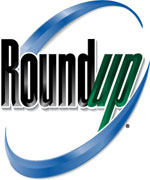Using Roundup as an example, discuss the potential ecological impacts of
pesticide
use. Don’t forget to discuss the potential impact on vernal pools.

Roundup
Most popular herbicide in use today (active ingredient is glyphosphate)
Called "Safe as table salt" by manufacturer 'Monsanto'
Company scientists falsified data to make product seem safe
Sued by the state of New York for claiming that it was 'safe'
Rated class III toxin by EPA
Why Roundup is Dangerous
Hurts non-targeted organisms
Can kill embryos at low concentrations (not caused by main ingredient)
85mL can be deadly to adult if ingested
Endocrine distributor, can cause genetic damage
Affects fish and other aquatic organisms more than terrestrial ones
24% sprayed in urban areas (sidewalks) can run off into water sources
Can last in soil for months before decomposing
Plants becoming resistant to
Vernal Pools
Inadvertently introduced to vernal pools via spraying
Can kill up to 70% of tadpoles in pool (and frogs too)
Cause illnesses / kill other organisms
Many small amphibians and small pond life are particularly susceptible.
Contaminates water supply and spreads throughout ecosystem
High concentrations in vernal pools because there is a small amount of water
Soil does not mitigate chemical's effects
General Problems
Companies lying about safety of products
overspray of herbicides into vernal pools/soil
effects on unintended organisms
effects on humans
Bibliography:
"RoundUp Herbicide Toxicity." Nature's Country Store. Web. 24
Feb. 2010. <http://www.naturescountrystore.com/roundup/>."RoundUp Herbicide Toxicity." . Web. 24
Feb. 2010. <http://www.naturescountrystore.com/roundup/>.
Nature's Country Store
"Pesticide Spray 1a.jpg" Web. 24
Feb. 2010. http://newcrossplatform.files.wordpress.com/2008/12/pesticide_spray1a.jpg
